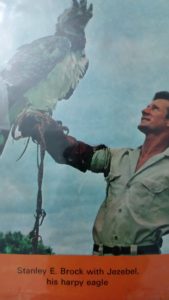 by Petamber Persaud
by Petamber Persaud
The book ‘Jungle Cowboy’ first published in 1972 was in 1999 reissued as ‘All the Cowboys were Indians’, a title that sits well with the current celebration of Amerindian Heritage Month in Guyana, an annual event held during the month of September initiated by President Cheddi Jagan in the late 1990s, setting aside a whole month to honour the contributions of our indigenous people. Apart from the adventures of Brock, ‘All the Cowboys were Indians’ celebrates the indomitable spirit, skill and knowledge of the ‘Indians’ – in this instance, mainly the Wai-Wai and Macushi nations, to survive in the wilds by living in accord with nature.
‘Jungle Cowboy’ was set in Guyana, South America. To be precise, it was set mainly on the Dadanawa Ranch in the Rupununi during the early 1950s and late 1960s. Stanley E. Brock, the author of ‘Jungle Cowboy’ and two other books – ‘Leemo’ and ‘More about Leemo’ – set on the above ranch passed away in Rockford, Tennessee, on August 29, 2018 at the age of 82. He died at the RAM Headquarters – his signature legacy to Guyana, America and the world. The idea for RAM – Remote Area Medical – came to him while on the ranch suffering from a nasty injury with the nearest healthcare weeks away.
Brock was born in 1936 in Preston, Lancashire, England. His school days were not enjoyable, confessing he was ‘a prisoner of the establishment …herded like a convict carrying armfuls of Chaucer, Homer, Henry VIII and the Holy Bible…’ Ironically, the location of the school was his saving grace, ‘set in the beautiful countryside of southern England’ where he developed a love for nature – ‘for gurgling streams, leaping salmon, birds, butterflies, bats, squirrels, the elusive stoat and the artful fox’. That love for nature was fired by tales of ‘boundless animal wonders’ in Guyana told to him by his father who had worked there on the installation of a new communications system.
Brock came to Guyana in August 1953, according to the book, at the age of 17, ‘stepping out alone into the world for the first time, with nothing’ but ten pounds in his pocket and ‘a thirst for adventure’.
And adventure was his name. Brock in the first chapter of the book, labelled, ‘I suddenly met a new way of life’, said while walking the streets of Georgetown, he chanced upon the head office of the Dadanawa Ranch: Rupununi Development, Co., Ltd. where he was hired on the spot to work some ‘350 miles’ away.
An intense narrative follows filled excitement and entertainment. More than that it was a narrative filled with many touching love stories, love stories with animals, wild animals. More than that it was filled with busted myths and living recipes on survival in the wilds – recipes like making farine, curare, roping longhorns, healing wounds without medicine etc. But the main thread and thrust of the narrative was rounding up cattle from the expansive savannahs of the Rupununi, corralling and sorting the animals and driving and swimming them to market in Georgetown by way of crossing the Berbice River by ferry and final trip by train from Rosignol to the abattoir in the city, a gruelling venture taking its toll on man, animal and the environment.
A sort of secondary thread in the narrative was according to the book’s blurb ‘Brock’s observations on South American’s wildlife, and collection of study material for the Royal Ontario Museum and the United States National Museum have been significant contribution to natural history knowledge’, resulting in at least one species of bats named in his honour, ‘Vampyressa Brocki’.
Adventure was his middle name and that’s how the book ended with a chapter titled ‘New Horizons’ wherein Brock was offered to do television on a popular show in the United States ‘Wild Kingdom’.
The closing paragraph is worth quoting: ‘Nothing much had changed since August of 1953. On that day a schoolboy had come. Now it was time for a cowboy to leave the Dadanawa’.
WHAT’S HAPPENING:
New Arrivals: Monsoon on the Fingers of God (poetry) by Sasenarine Persaud; Red Hibiscus (novel) by Scott Ting-A-Kee; Aftermath of Empire: The Novels of Roy A. K. Heath (literary criticism) by Ameena Gafoor.
Responses to this author telephone (592) 226-0065 or email: oraltradition2002@yahoo.com (Times Sunday Magazine)



